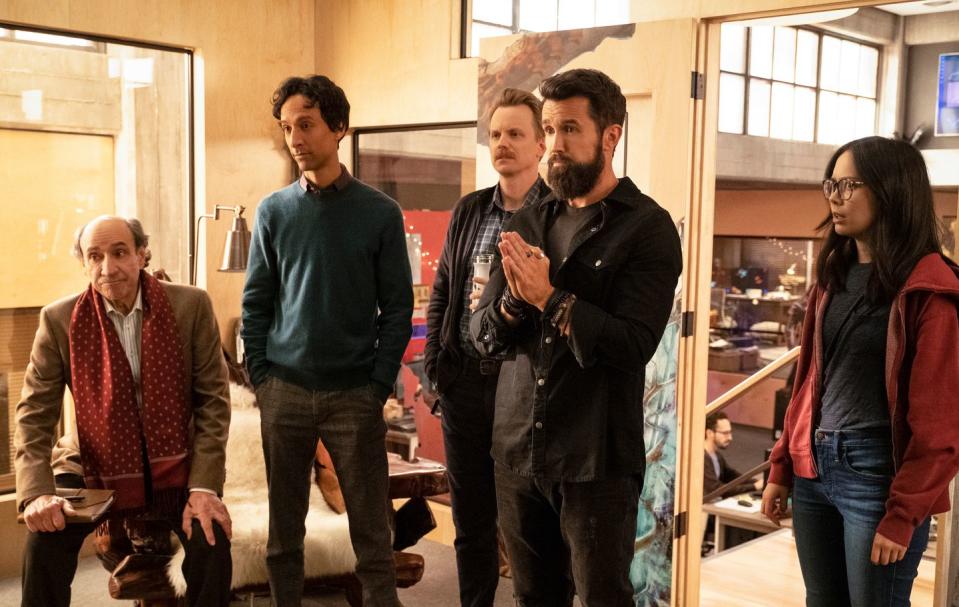Of Course Rob McElhenney Found an Excuse to Take His Shirt Off in 'Mythic Quest'
For now 15 years, Rob McElhenney has been playing Mac, the dim-witted, hot-headed bartender on It's Always Sunny in Philadelphia, and at first glimpse, his character on Mythic Quest: Raven's Banquet appears pretty similar. (After all, the new Apple TV+ show comes from much of the same team behind Sunny.) It doesn't take much watching, though, to realize the characters are anything but: Mac is ignorant in general, but Ian Grimm, on Mythic Quest, is ignorant of his surroundings. He's extremely smart, but also extremely narcissistic.
And while McElhenney's Mythic Quest character largely sways away from Mac, there are some things that never change: he likes to take his shirt off.
"He just needed to be shirtless," says Megan Ganz, Mythic Quest's co-showrunner who's also worked with McElhenney and company on Sunny since 2017. "There's a wafer-thin line between Rob making fun of somebody that would take his shirt off all the time, and Rob himself taking his shirt off all the time."
Sitting just to her right in a New York City hotel suite, McElhenney agreed with her assessment. He made sure to note, however, that his own television history included a skew the other way as well.
"I hope I’ve built up enough capital by also doing an entire season where I was so morbidly obese, and also took my shirt off all the time," he said, referring to Sunny's 7th season, where McElhenney gained 50 pounds, transforming the wildly-self-absorbed Mac into one of the most memorable single-season characters in recent television history: Fat Mac (who remained wildly self-absorbed).
"Equal opportunity," Ganz added.
In Mythic Quest, McElhenney's Ian is the creative director and creator of the massive online video game for which the show is named. While the character has a distinctly Jack Dorsey look—from the black turtleneck to the twiggy beard—he's actually based on a number of real-life video game creative directors that McElhenney met in his preparation for the show, drawing different traits from four or five different people ("By the way, all dudes," he adds).
And while that narcissism generally tends to manifest itself into company strategy and self-aggrandizing, it also meant an excuse to show off his impressively sculpted body once again. McElhenney says he wasn't in as great of shape as usual when he found out about the shirtless scene, which he didn't have a ton of time to get ready for.
"I was like, 'OK, I’ve got three weeks to get into some kind of shape,'" he says with a chuckle. "And then the day before, I didn’t eat anything, and I probably did 1,000 push-ups, like, right before we shot. "
Not necessarily the fitness/diet routine we'd recommend, but desperate times call for desperate measures.

Everyone knows what video games are, but their on-screen depiction typically tends to be much of the same: nerd stereotypes and shallow jokes take up much of the space. That's why McElhenney wanted to steer clear of the "marginalized, surface-level caricautres" that he's seen elsewhere, instead opting to look for something deeper.
"Everybody you know plays a game of some sort," he says. "It might not be Call of Duty, but it might be a mobile game—Candy Crush. It might be The New York Times crossword puzzle. I mean, that is a game, right? Right now, if you don’t consider it a video game, most people I know are doing it on their phones. That’s a video game. Everybody you know is affected, and a part of this culture, so let’s treat it as such, and not just look for easy tropes to make fun of."
Structurally, Mythic Quest is a workplace comedy. The Office has an office. Silicon Valley has California-based tech start-ups. Sunny has a bar. Mythic Quest, thusly, has the video game industry; you don't need to be an expert on the world to get the jokes, but fans and those in the know will be pleased to see rampant issues of the world explored. One character, Poppy, is the company's female head of programming, and the show doesn't gloss around how uncommon it is in that world for a woman to be in that position.
"We had to reference the realities of how extreme it is that Poppy would have the position that she has; what a unique position she’s in," Ganz says.
That being said, it doesn't make her out to be any sort of a saint, either. Actress Charlotte Nicdau is one of the show's standouts, and she plays Poppy as just as much of a power-hungry and situationally-ambitious character as any of her on-screen counterparts. "It turns out, it’s not just the testosterone, it’s also the position of power," McElhenney says. "Because of the structure that’s been set up over thousands of years by….men, women have not traditionally been in those positions of power."
Aside from McElhenney, Mythic Quest has a few more familiar faces that you'll probably recognize—but doing different things than you're accustomed to. Danny Pudi (Community) swaps his warm, pop culture obsessive Community persona to play the game's head of monetization—a major jerk. David Hornsby, who Sunny fans know as the forever-spiraling Rickety Cricket, plays the game's executive producer—significantly closer to the person that he is in real life, Ganz says.
McElhenney puts the distinction in characters a bit more plainly: where Sunny characters are "ostensibly, live action cartoon characters," the characters in Mythic Quest are closer to human beings that you might see in the elevator or at the water cooler.
At the end of the day, Mythic Quest is looking to be the comedy that exists for the countless number of people for whom video games are a daily release, a respite from the stresses and anxieties of the real world.
You Might Also Like

